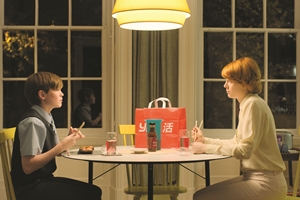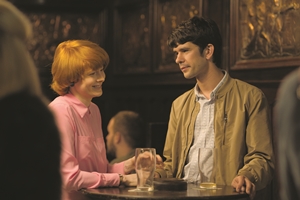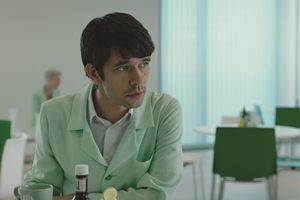Canada: Friday, December 06, 2019
Magnolia Pictures
LITTLE JOE follows Alice (Emily Beecham), a single mother and dedicated senior plant breeder at a corporation engaged in developing new species. She has engineered a special crimson flower, remarkable not only for its beauty but also for its therapeutic value: if kept at the ideal temperature, fed properly and spoken to regularly, this plant makes its owner happy. Against company policy, Alice takes one home as a gift for her teenage son, Joe. They christen it 'Little Joe.' But as their plant grows, so too does Alice's suspicion that her new creation may not be as harmless as its nickname suggests.
Cast & Crew
Movie Cast
Movie Crew
User Reviews
Public Reviews - 1 Reviews
-
Gregory M. - Rated it 3 out of 5
"Little Joe" "Little Joe" follows Alice Woodard (Emily Beecham), a single mother and dedicated senior plant breeder at a corporation engaged in developing new species. She has engineered a special crimson flower, remarkable not only for it's beauty but also for it's therapeutic value; if kept at the ideal temperature, fed properly and spoken to regularly, this plant makes it's owner happy. Against company policy, Alice takes one home as a gift for her teenage son, Joe (Kit Connor). They christen it ‘Little Joe'. But as their plant grows, so too does Alice's suspicion that her new creation may not be as harmless as it's nickname suggests. "Little Joe" creates an atmosphere within the scenes that allows the audience to question the integrity of the characters involved. The film offers different ways of interpreting what's happening: the so-called changes in people can either be explained by their psychological state of mind, or by the pollen they have inhaled. Or alternatively, those changes do not exist at all and are only imagined by Bella (Kerry Fox) or Alice. The film creates those moments that retain an ambiguity in order for the audience to always have the possibility of finding an answer. In fairy-tales and stories, and also in the present day, we perceive the mother as inseparably linked with her child in some invisible way. In the best scenario, this bond is a loving one, but in any case it cannot be broken, and it forms the basis for the unquestionable responsibility of a mother for her child. Every working mother is familiar with being asked the question which is often laden with accusation. So, who looks after your child when you go to work? "Little Joe" is about a mother who's tormented by her bad conscience when she goes to work and neglects her child. A mother whose feelings are ambivalent, because the plant is Alice's other child; her work, her creation, the product of her labor. And she doesn't want to neglect this child either or lose it. But which of her children will Alice choose in the end. Both of the female main characters, Alice as well as Bella, seem to be psychologically instable. Alice regularly attends psychotherapy, where her bad conscience towards her son, her being a workaholic and her secret fears are being discussed. We learn that what seems to be a threat upon Alice's career her plant possibly changes the people who come in contact with it and thus alienates them from their loved ones could as well be interpreted as Alice's most secret wish coming true; to free herself from the bond with her child. To be able to focus on her own desires and interests. To have a bit more time for herself. A wish that she shouldn't blame herself for. The plant appears to have a life of it's own; it emits pollen according to it's own criteria, though we don't know whether this is by chance or conscious intention. Is 'Little Joe' attempting to overcome it's infertility, which Alice engineered? Is it securing it's survival by infecting people and robbing them of their feelings? So that those who've been infected will now serve 'Little Joe'? That theory sounds fantastical, and initially Alice laughs at it, but not for long. Today, we're confronted with living beings which are products of genetic engineering and we cannot really know for certain what kind of danger they may conceal. Perhaps none at all, but we can't be sure. One body of opinion insists that to be on the safe side we should protect ourselves from this eventuality, while another claims that everything is under control. Without taking sides here, the film is interested in this aspect of our time, which is determined on the one hand by scientific developments and on the other by semi-truths that are spread on the internet. And by the uncanny realization that even scientists can only surmise, without knowing for certain. It's fertile soil for all manner of conspiracy theories. And when she finally achieves that freedom; the film comes to a happy end. The idea behind the story is that every individual conceals a secret which cannot be completely appreciated by an outsider or even by that individual. Something strange inside us appears unexpectedly and makes the familiar seem uncanny. Somebody we know suddenly seems strange. Proximity is transformed into distance. The desire for mutual understanding, empathy and symbiosis is unfulfilled. In this sense, "Little Joe" is a parable about what is strange within ourselves. This becomes tangible in the film by means of a plant which is apparently capable of changing people. As result of this change something unfamiliar emerges, and something believed to be secure is lost; the bond between two people. It seems that the film's aesthetic is even more abstract or artificial in "Little Joe" than in "Amour Fou". "Amour Fou" was perhaps a steppingstone because with a historical setting, you're already entering a fantasy world. None of us were there, we only have pictures to refer to, which are already another artist's impression. It's already a kind of invented world that you're designing. Obviously, the film is inspired by greenhouses, laboratories, real places, but in the end, the film creates a kind of artificial world. We've to reflect the fairy-tale nature of the story. For example, with the colors, there's the mint green and white, and then the red of the flower. The film choses these almost childish colors to give the film the characteristics of a fairy-tale or fable. Also, Alice's red hair for example, that's a very important point, almost iconographicalthis bright red mushroom hairstyle that she has. The costume design focuses on creating a reality of it's own, iconic key pieces such as pearl earrings and a red hat are repeatedly used, the colors are obviously styled corresponding to the set design. And there's humor in the costumes; a ridiculous dress, a suit too large. The same holds true for the cinematography. The framing tries to question reality as we play with different perspectives, what the viewer does and does not see; we maintain a level of uncertainty with what's kept hidden. As an audience you realize that you've only been shown a fragment. And one begins to ask oneself what's behind it, what's wrong, what's happening where I can't see? The framing and the narrative emphasize this question; what do we not see? What's hidden offscreen? For example, when Bella says, 'I think it's 'Little Joe's' pollen, that triggered something', the camera approaches her, but then the camera is panning past her and there's a slight disappointment or a questioning of her authority, as if she's not the person who can provide the answer for us, and what she's just said might not be true. The music creates emotions, it's even scary, but it's also abstract; it draws you in and pushes you back at the same time. And because of that, the rhythm of the film or the narrative already connected with this music during the shoot. This being said, it's due to the very unique character of this music, that it remains a character in itself. It's the story of a woman, a plant breeder who invents a genetically modified plant, a beautiful flower. We like 'The Little Shop Of Horrors', where the flower eats you. "Little Shop Of Horrors" is maybe a source of inspiration for the film. The flower Alice creates has a lovely scent and it's supposed to make you happy. But after a while, the plant appears to influence people in a way that makes them not themselves anymore. There are no specific they don't have any allergic reactions or display any particular psychological changes. Someone who didn't know that person very well wouldn't notice the difference; they'd think they're the same as always. Only the ones who are very close, such as a mother and her son, would see the change. She might say that's not my son anymore, what happened to him? That's a real psychiatric disorder, a neurological sort of thing. It's the delusion that someone close to you has been replaced by an impostor. In the story, it's also possible that the person who believes that, has a psychiatric problem. We don't know if the person is inventing it or imagining it, or if it's really happening. The ambiguity is there through the whole story. But we do find out that the pollen of the plant contains something that may cause a change of personality. We came up with it not knowing if it might actually be possible. Which plants are bred artificially? Why we've a market for this science. Finding out what people look for in plants and what sells well. What are the trends? What's benefiting science and what's benefiting the economy? And with what intention? Of course, with food crops, the overriding theme is developing the durability and resilience of plants. Because, in fact, this utopia existsthe scent of a plant can make a person happy. You smell a flower and you can almost see the smile on the faces, that's the idea of a flower. It's beautiful and it smells good. It's about the idea of a fragrance that makes everyone happy, be it by pheromones or other hormonal substances that are emitted by the flowers. It's alchemical; scientists who are creating spells. It's a complicated part, finding a connection, determining if and how a plant could ever infect a human. It could be a virus because a virus is flexible enough and can mutate in a way that could adapt from a plant virus into a human virus. This is very unlikely, but conceivable in certain circumstances. Science tries things, and nobody can ever predict the consequences. And yet it's done. And sometimes there are positive effects. This is similar to the theme of the film, "Lourdes", where the miracle is good and bad at the same time. In this story, the invention is good, because the people who inhale the fragrance of the plant are happy. It works. But the downside, well that's what interests most, these contradictory and conflicting situations, these 'Gordian Knots' that are virtually impossible to undo. You feel like you're in 'Brave New World', endless number of computerized flower cars driving around. The story is about a plant whose fragrance has been genetically engineered and the scent makes the people who smell the plant happy. Is such a scent possible? What this plant could be doing is giving off a combination of chemicals, let's say peptides and steroids, or it could contain a virus. If you want it to contain a virus, then it's not the plant itself. That virus could be targeting brain cells, specific kinds of brain cells and in doing so, it could be turning them on and off and it would regulate behavior. Plants and viruses have been using us for 100 million years. They create substances that affect our behavior. Plants make nicotine, they make opiates, they make all sort of chemicals that regulate our behavior. It's as if they're using us all along. We use them but they use us. From viruses, we've picked up little pieces of 'DNA' called transposons. You can also get transposons from food. They can get into the lining of the gut and become part of you. So you can become the part of Austria that you are from because you eat specific strains of food there. And if those regulate your behavior, then you can get not only a taste for them, but you can also develop a need for them. It's all this cross-species stuff, where the virus most of the time is specific. But there are crossovers. It's a rare event, but to say this couldn't happen is misinformed. For example that they're nearly the same as they used to be, but that the emotions that they feel are not really true anymore. That you only act as if you love someone, but you don't really love them anymore. So, not the behavioral area but only the emotional? Maybe you wouldn't notice it so much, is that right? If the virus only influences, changes or blocks the emotional part. How do you talk to somebody's emotions? How do you get down here? By talking to the upper part of the prefrontal cortex and that connects back to the hippocampus and amygdala and that's where you change the connection of the memories with the emotion. If there's such a scent, you would probably be a millionaire. It's unlikely that we will find one for people. Probably not for animals either, because in terms of evolution, happiness is not an interesting trait. For evolution to develop sensory traits, they need to be important to survival, if they're good for procreation, for example, but not for something as general as how happy one is. Plants naturally have fragrances that attract animals to spread the pollen. There are a whole series of examples. Plants develop a kind of scent that animals react to and are attracted to, then they've to get a reward for it. You could imagine that with people too. Because the reward center in the brain is very active and also seduces us into different actions. We're attracted to products that upset the reward system, so we still eat it, even though we know it's not so good for us. In this direction, you could imagine something. This is called conditioning. You've learned that you get a reward and the fragrance itself is enough to reward us. Every person associates a scent with their personal experience with the scent. If you've smelled a fragrance in a happy situation, the fragrance can rekindle this happy situation. And the same scent can cause unpleasant feelings for another person who has smelled it in a very unpleasant situation. Is that conceivable? Similar to a drug? There's no indication that we've a sensor, a receptor though we do not have many pheromone receptors, we've just decrypted the first one, it does not make us happy but it has something to do with hormones. These are hormones that have to do with trust. This is in the hypothalamus, a core area in the hypothalamus. There, this fragrance causes an excitement in everyone in the same area. There's a wiring between the cells in the nose that smell and transmit to the brain. You can stop splitting the atom; you can stop visiting the moon; you can stop using aerosols; you may even decide not to kill entire populations by the use of a few bombs. But you cannot recall a new form of life. It will survive you and your children and your children's children. An irreversible attack on the biosphere is something so unheard-of, so unthinkable to previous generations, that we could only wish that mine had not been guilty of it. The hybridization of 'Prometheus' with 'Herostratus' is bound to give evil results. Have we the right to counteract, irreversibly, the evolutionary wisdom of millions of years, in order to satisfy the ambition and the curiosity of a few scientists? This world is given to us on loan. We come and we go; and after a time we leave earth and air and water to others who come after us. Our generation, or perhaps the one preceding mine, has been the first to engage, under the leadership of the exact sciences, in a destructive colonial warfare against nature. The future will curse us for it. written by Gregory Mann




